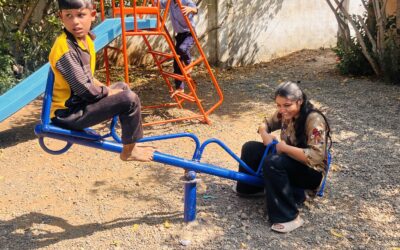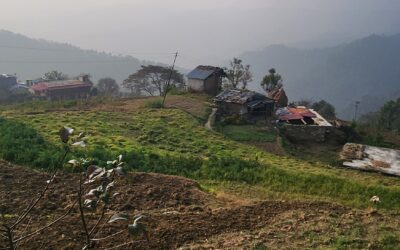When the day begins, I don’t know how it’s going to end. India Fellow sometimes sounds taxing to people looking at it from the outside. The unpredictability, the lack of structure on some days, having to be ready on the go. But I think this is exactly what keeps me on toes. Most days are stimulating and you extract the amount you want to learn. The anticipation in the beginning of the day keeps me going. That, combined with saying yes to everything and initiating in addition to just taking up what’s on offer. I’ll tell you about a day in this piece – a day that began at 6:30 am and ended at 1:30 am.
Home
I begin with exercise, bath and breakfast. I feel prepared to go to office for work I am hoping to finish so that I can have the rest of the four days in the week for field work. As I get to ready to leave, Vijay ji (our ambulance pilot) calls me to collect another colleague’s laptop. Vijay ji and Amruth (family physician working in Gogunda) would then go to Rawach (location of one of our clinics) for follow up day. Somehow, they convince me to come with them to Rawach, or let’s be honest and call it suggestibility.
Rawach Circle
On reaching Rawach, two of our health workers are already sitting in a circle with male patients majorly suffering from TB/Silicosis. This time, they speak about Malaria. I join them and listen. As the session on Malaria comes to an end, there’s some discussion about encouraging the younger generation to develop other skills and telling them about alternate options instead of taking up jobs like mining, building temples.

Soon after, there’s discussion about how some patients continue consuming alcohol while on their medication course, saying the alcohol cleans their lungs…
I ask the patients if they don’t say the same for drinking water? Silly question, of course not. There’s some light conversation around this after which I try understanding the cause for the beginnings of addiction here. Is it work stress? Marital unhappiness? Family? But it seems to be as simple as being in certain peer groups. One peer drinks and encourages another one to try it. This happens a few times and soon alcohol is the go to. After this stage, the body can’t rest without getting ‘its dose’. In these persons then, alcohol is experienced and perceived as medicine (at least a relaxant from a hard day’s work, certainly).
I must take it to be well. I must take it to fall asleep. I must take it to exist in this world/survive with or without my capacity to function intact
Bike
After having learnt to tango with a scooter during my fellowship with India Fellow itself, I now wanted to learn bike. As we neared lunch time, I spontaneously asked my 3 colleagues and health workers to teach me. One of them exceeded my own enthusiasm and we began. A few jumpstarts and sudden stops, I felt a little in control of the bike. But I think I was still a little confused about whether or not to press the clutch and break together. The health worker sitting behind me warns of an approaching tractor and tells me to go slow.
In the panic of that warning, I do something, lose control and both of fall down with the bike. The mirror on the left side is broken. The health worker is fine. Part of my palm and shin are bruised but it feels normal. I expected this to happen. In fact, I feel relieved this happened because my tendency is to continue fearing falling until I fall at least once. It was in Rawach that I had my first scooter fall too. After which I lay low for a month before mustering up courage and telling myself this is all part of the journey and experience.
Also read: My Everyday Life In a Village Of Kanpur
I think of my father here. He’s taught me to drive a car and yet fears me being involved in an accident or injuring myself. So each time I’ve told him to sit in the passenger seat so I can practice, he would make comments like “Abhi hath saaf hona baaki hai”. And I think to myself, of course hath saaf hona baaki hai because that comes with practice and since there’s rare availability of someone papa trusts to be his practicing daughter’s co- passenger, I must depend on him and his availability has been rare. So are arguments just keep running in circles. Which is why me being an excellent rider is of utmost importance to me and I must do this on my own irrespective of how much falling the journey entails.
Lunch Time

I sit with Sigri bai in her room and tell her i’m not hungry and I’ll eat later. But there’s no way I can be in her room and skip eating. I keep her company, we talk, I eat one roti. After this I see that her table fan is full of dirt and we argue about her letting me clean it. There’s no winning here, either. My closest friends at this work place happen to have a common trait: stubbornness. Later I also think of the contrast.
She is a woman who keeps the clinic spick and span. Our clinic doesn’t have the slightest hospital air because of her.
She keeps everything so clean and yet when it comes to this fan in her own room and the air she is breathing, she keeps postponing the cleaning. On the surface, this might merely seem like the difference between who we are at work and home. But I know, in this case it’s not. She herself is really conscious about cleanliness. There would be at least one slip up in the work place if it weren’t for this constant self of hers. So then it comes down to only one reason- tiredness.
When you are so tired with work and the world, the only thing you can possibly ignore and take for granted or postpone for later is yourself. The same goes for so many people here – the patients we see – and them postponing health seeking. They postpone themselves because everything else is already too much. At least one place must feel like a little less burden to bear, shouldn’t it? In some case this turns into negligence for children. So it’s not mere ignorance, it’s exhaustion.
This One Patient
After lunch, I go down and a patient’s admitted on one of our beds. The male patient is accompanied by his wife and a 7 month old daughter. I take an instant liking to this little girl – Riya. She is amused by my facial expressions, lets out giggles and looks at her mother. It’s interesting when children do that, checking in with their care taker – is this person safe? Shall I engage? Do you like her too? The child constantly checks in with the mother’s facial expression and mine – looking back and forth.
Riya is at the sensory motor stage. I need not recall the substages as she grasps my thumb. I need not recall substages as she later takes my thumb in her mouth. Riya is yet to discover the difference between herself and the world. Meanwhile she uses seeing, sucking, touching, feeling.
I carry Riya and go outside while her father’s drip bottle is being changed. Some health workers take a picture of me and Riya and later as I look at the series of pictures, I realize how I hold her is the kind of (symbolic) holding I want from my relationships. Where I am held firmly and securely while the person holding doesn’t focus all their attention on me all the time. I do not want to be obsessively, tightly grasped while the person fears me fleeing or falling, I want to be held securely while we can both rhythmically oscillate between the world and me.
A few minutes after I take Riya back to her mother, she pees. I don’t carry her after that. This reminds me of Vinod sir during my Masters.
“In oohing and aahing over the child’s cuteness, we forget that the child shits and pees. We forget the human ness of the child and the inherent ugliness in our humanness and the reality and normality of what we call ugly.”
This thought with the holding of relationships is uncomfortable. So do I drop the person at the slightest of inconvenience? I know this is me just playing with my thoughts and that I wouldn’t have ewwed if the child peed while she was on my lap. I knew I would be calm about it and it would be a funny moment, I know this from prior experiences with children peeing while on my lap. But I don’t think I am ready to take pride in my lack of disgust and in staying put because I know this also comes from the socialization process of women in general. So a part of me probably wants to resist that.
To be continued …




It is refreshing to read the blogs by the fellows…brings back to the inner talk and the external reality ….